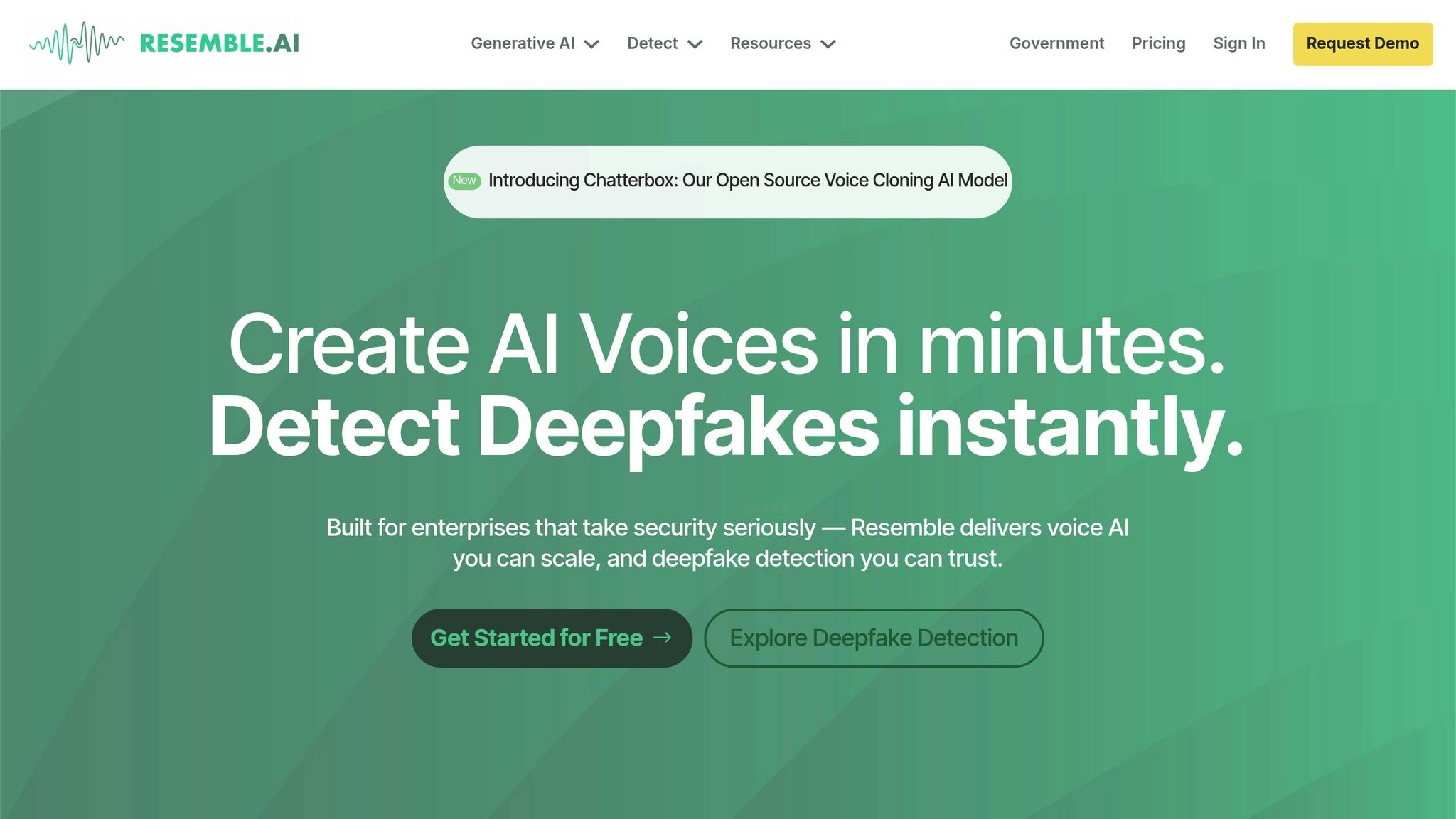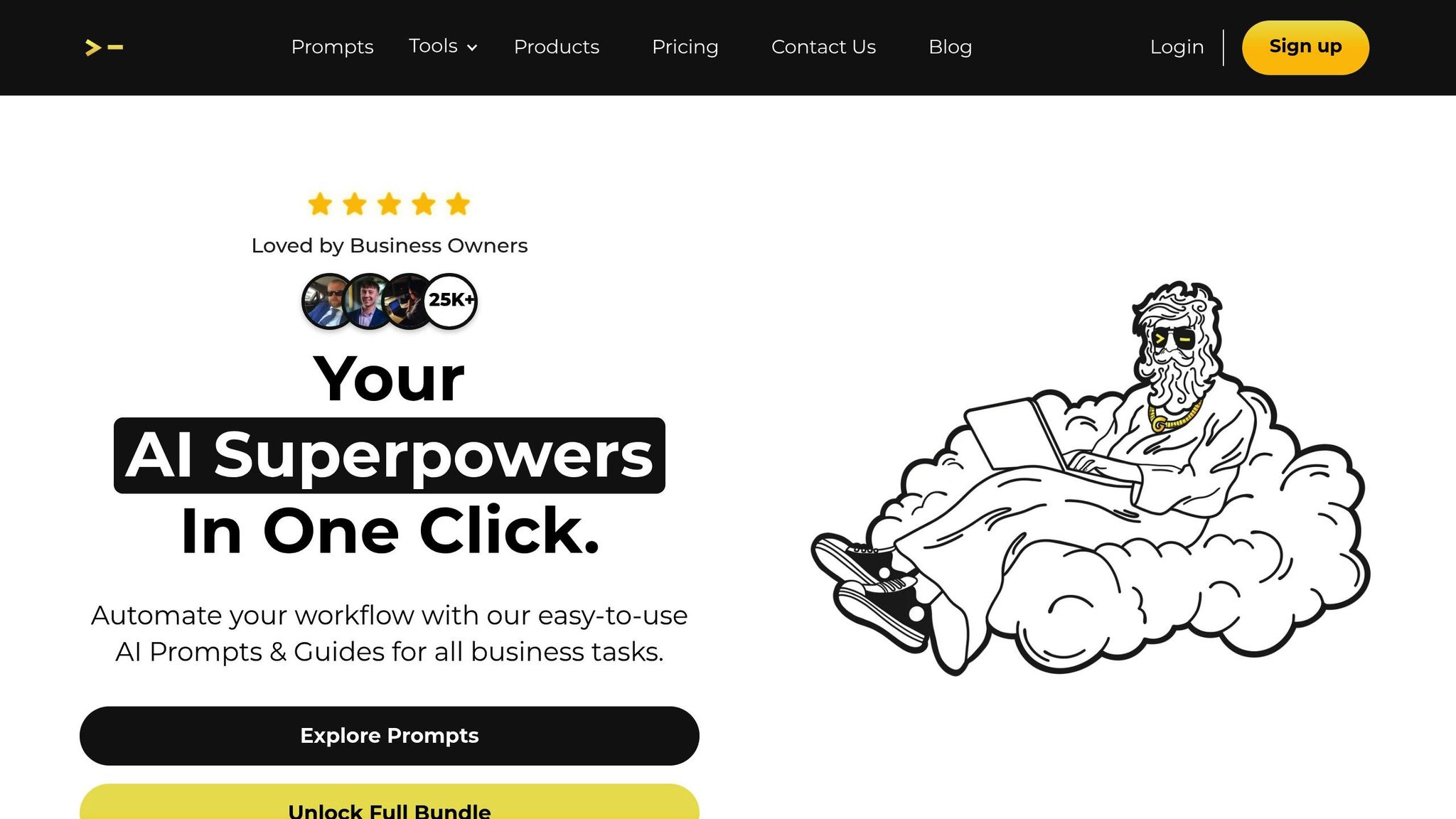Voice Clone Technology: Business Applications Revealed

Voice cloning is changing how businesses communicate and operate. It uses AI to replicate human voices with precision, offering benefits like cost savings, personalized customer interactions, and accessibility improvements. Here's a quick summary of what you need to know:
- What It Is: AI mimics human voices, capturing tone, emotion, and rhythm.
- Business Benefits: Reduced costs, consistent branding, multilingual support, and improved customer service.
- Key Applications: Customer service (e.g., AI assistants), marketing (personalized ads), and operations (training materials, compliance messaging).
- Market Growth: Expected to grow from $1.2B in 2023 to $3.8B by 2028, driven by demand for AI solutions.
- Top Tools: ElevenLabs (professional quality), Resemble AI (speed and multilingual support), and God of Prompt (workflow optimization).
Quick Tip: If you're considering voice cloning, focus on security, consent, and ethical use to protect your brand and data.
Read on for detailed insights, examples, and tools to get started.
ElevenLabs AI for business | AI voice cloning, instant dubbing & MORE!
Business Applications of Voice Cloning
Voice cloning is reshaping how businesses operate, offering tools to improve customer experiences, cut costs, and create more personalized interactions.
Customer Service Enhancements
Voice cloning brings a human touch to customer service while improving efficiency. For instance, Capital One's Eno provides 24/7 support by automating routine banking inquiries, leading to shorter wait times and lower costs. Similarly, Vodafone's TOBi handled high call volumes during promotional periods, reducing expenses and enhancing customer loyalty. Virgin Money, with assistance from IBM Consulting® AI experts, launched Redi, an AI-powered assistant integrated into their mobile app. Redi has handled over 2 million customer interactions, achieving a 94% satisfaction rate among surveyed users.
This technology can cut call handling times by up to 40% and reduce the cost per customer interaction by 23.5%, while boosting annual revenue by an average of 4%. These benefits stem from features like personalized greetings, multilingual support, and automated appointment reminders.
Modern voice cloning also improves interactive voice response (IVR) systems, replacing robotic prompts with natural, conversational voices. These systems can adjust tone and responses based on caller needs, integrate voice authentication for security, and provide real-time support to human agents. These advancements make interactions smoother and pave the way for more targeted and personalized marketing opportunities.
Marketing and Sales Personalization
Voice cloning is transforming marketing by enabling tailored campaigns that resonate emotionally with customers. Platforms like Spotify and Pandora have used personalized audio ads to boost engagement by up to 35%. McKinsey research further supports this, showing that companies personalizing their marketing messages see a 10–15% increase in revenue.
Businesses can create signature brand voices that stay consistent across all audio channels. This allows for campaigns that address customers by name or even feature cloned voices of celebrities or company representatives. Such personalization has proven effective, as personalized emails generate six times higher transaction rates compared to generic ones. Additionally, voice cloning supports localized marketing by adapting content for different regions while retaining the original spokesperson's voice.
Sales teams also benefit from AI-driven representatives using cloned voices that sound natural and empathetic. These systems deliver tailored pitches based on customer profiles, creating engaging and effective interactions while maintaining a balance between technology and human-like connection.
Beyond marketing and customer engagement, voice cloning is also making strides in operational efficiency and accessibility.
Operations and Accessibility Advancements
Voice cloning is streamlining internal operations and improving accessibility, creating a more inclusive and efficient business environment. For example, BSH reduced external video production costs by over 70% by using Synthesia to create localized training content. Bestseller also leveraged Synthesia to develop training materials that are easy to update and scale across regions, saving time and money compared to traditional methods.
The technology also enhances accessibility for individuals with disabilities, particularly visually impaired users, by enabling seamless navigation through voice assistants. Multilingual support allows users to interact in their preferred language, ensuring personalized assistance and a more inclusive experience.
Operational benefits extend further. Voice cloning can automate compliance messaging, produce consistent training materials, and provide 24/7 customer service without additional staffing costs. With 93% of consumers expressing satisfaction with voice assistants and predictions that AI will handle 65.7% of customer inquiries by 2025, businesses are preparing for a future where voice-first interactions dominate.
Companies adopting voice cloning report smoother customer interactions and improved productivity. By maintaining consistent brand messaging across all audio channels, businesses save time and resources on content creation and updates. This allows teams to focus on more strategic tasks while ensuring customers receive high-quality, consistent service.
From customer service to marketing and internal operations, voice cloning is delivering measurable gains in efficiency, personalization, and accessibility - redefining how businesses engage with their customers and optimize their processes.
Voice Cloning Tools for Businesses
The voice cloning industry is growing at an impressive pace, with forecasts estimating an increase from $1.2 billion in 2023 to more than $3.8 billion by 2028. For U.S. businesses, several platforms offer advanced voice cloning solutions, each tailored to meet diverse operational needs. Let’s take a closer look at some of the standout players in this space.
ElevenLabs: Features and Business Use Cases
For businesses seeking high-quality voice cloning, ElevenLabs is a top contender. It provides both instant and professional voice cloning options, offering flexibility to suit varying requirements.
One of its standout offerings is the Professional Voice Clones, available at $22 per month, which includes full API access. This combination of affordability and functionality has earned praise from industry experts.
"For me, ElevenLabs currently has the best Professional Voice Clones on the market, at the most economic deal for API usage. For USD 22,- per month, the quality + API-availabiltiy is, as of now, unmatched." – Leander C. Seidl
The platform is especially well-suited for complex workflows and long-form audio projects, making it ideal for creating training materials, marketing content, or enhancing customer service. Its robust API capabilities also enable developers to design custom solutions that can adapt as businesses grow.
Resemble AI: Capabilities and Integration

Resemble AI takes a different approach by focusing on speed and efficiency. Its Rapid Voice Clone 2.0 model requires just 20 seconds of audio to produce a high-quality voice clone, making it a great option for businesses working under tight deadlines.
This model, launched in February 2025, has already made waves. A blind survey revealed that 85% of participants preferred Resemble AI's voice clones. This achievement highlights the platform’s dedication to improving voice quality while maintaining speed.
"At Resemble AI we are continually iterating on our models and bring the best in class to voice cloning technology. What makes Resemble AI unique is our ability to capture the authenticity of any voice in minutes, from subtle accent nuances to emotional expression." – Zohaib Ahmed, CEO and Co-founder of Resemble AI
Resemble AI offers flexible pricing plans, including:
- Pay As You Go: $0.018 per minute
- Creator Plan: $19 per month
- Professional Plan: $99 per month
- Business Plan: $699 per month
Custom pricing is also available for enterprise-scale implementations. Additionally, the platform supports 120+ languages, offers ethical safeguards like consent-driven voice creation, and incorporates invisible watermarking. These features make it a reliable choice for businesses that prioritize both speed and ethical compliance.
God of Prompt: AI Resources for Workflow Optimization

For businesses looking to streamline their workflows, God of Prompt provides a unique solution. Rather than focusing solely on voice cloning, it offers structured AI prompts and guides to enhance productivity across various applications, including voice cloning.
The platform boasts over 30,000 AI prompts for tools like ChatGPT, Claude, Midjourney, and Gemini AI. Here are some of its key offerings:
- Complete AI Bundle: Unlimited access to 30,000+ prompts for $150
- Writing Pack: 200+ mega-prompts for $37
- ChatGPT Bundle: 2,000+ mega-prompts for $97
All plans include lifetime updates and are accessible via Notion, ensuring teams can collaborate effectively and stay up-to-date with evolving technologies. A 7-day money-back guarantee allows businesses to explore the platform risk-free.
Choosing the Right Tool
Each of these platforms offers a distinct approach to voice cloning. ElevenLabs delivers professional-grade quality with strong API support, Resemble AI focuses on speed and multilingual capabilities, and God of Prompt provides strategic tools to optimize workflows. Together, they represent a broad spectrum of options for businesses looking to integrate voice cloning into their operations.
sbb-itb-58f115e
How to Implement Voice Cloning in Business Workflows
Bringing voice cloning technology into your business operations isn't just about picking a tool and hitting "go." It requires careful planning, smart choices, and ongoing tweaks to make sure you're getting the most out of your investment. Here's how to approach it.
Steps for Integration
First, identify exactly where voice cloning fits into your business. Are you using it for customer service, marketing, or maybe training? Knowing the use case will guide your decisions.
Next, gather high-quality audio recordings. You'll want recordings that are clear, free of background noise, and include a variety of speech patterns to ensure the cloned voice sounds as natural as possible.
Security is non-negotiable. Put strong protocols in place to protect voice data and always get proper consent before using anyone's voice.
When it’s time to deploy, think about your infrastructure. Cloud-based solutions are great for scalability and lower upfront costs, while on-premise setups give you full control.
Finally, this isn’t a "set it and forget it" situation. Regularly test the system, gather user feedback, and tweak as needed to keep up with your business’s evolving goals.
Maximizing ROI with Voice Cloning
Voice cloning can save you money, boost revenue, and improve productivity - all while enhancing customer experience.
For example, it can cut costs by reducing the need for traditional voice-over services, trimming customer service staffing, and streamlining content creation. Mercery, for instance, slashed ticket volume by 74%. Meanwhile, Bank of America’s AI assistant Erica manages an impressive 2.4 billion interactions annually with a 98% containment rate.
On top of cost savings, voice cloning allows for personalized customer interactions and consistent messaging across channels. This kind of tailored communication can lead to higher engagement and better conversion rates. To measure the impact, track metrics like labor cost savings, revenue growth from AI initiatives, and time efficiency. For example, Pinterest saw a noticeable drop in issue rates for its top campaigns after adopting AI-powered solutions.
Voice Cloning Tools Comparison
Once you understand how to integrate voice cloning and the potential ROI, the next step is choosing the right tool. Here’s a comparison of three popular options:
| Feature | ElevenLabs | Resemble AI | God of Prompt |
|---|---|---|---|
| Primary Focus | Professional voice quality with API access | Speed and efficiency | Workflow optimization and AI prompt resources |
| Pricing | $22/month for Professional Voice Clones | Flexible pricing plans | $37–$150 (one-time payment with lifetime updates) |
| Key Strength | High-quality output with robust API integration | Fast voice cloning with multilingual support | 30,000+ AI prompts for workflow enhancement |
| Best For | Complex workflows and long-form content | Rapid turnaround projects | Strategic implementation and optimization |
| Technical Requirements | API integration capabilities | Minimal setup | Notion access for collaboration |
| Support Level | Enterprise SLAs and dedicated support | Flexible support options | 7-day money-back guarantee |
Resemble AI stands out for its speed and multilingual capabilities, which makes it ideal for quick-turnaround projects. It’s also flexible enough to suit businesses of all sizes.
On the other hand, God of Prompt offers something different. It’s not a voice cloning tool per se but a resource hub with over 30,000 AI prompts and guides aimed at improving workflows. Its one-time pricing model with lifetime updates can appeal to businesses looking for long-term efficiency gains across various AI applications.
ElevenLabs, meanwhile, is a strong contender for businesses needing high-quality voice output and robust API integration, making it a great pick for complex workflows or long-form content creation.
Ethical and Legal Considerations
Voice cloning technology presents both exciting opportunities and serious challenges. While it can transform business processes, it also calls for careful ethical oversight. The AI voice cloning market is projected to grow from $1.9 billion in 2023 to $9.8 billion by 2030, with an annual growth rate of 26.1%. This rapid expansion has drawn attention from regulators and consumers alike.
A 2023 McAfee study revealed that one in four people surveyed had experienced an AI voice cloning scam or knew someone who had. Adding to the concern, a University College London study found that participants could only identify deepfake audio accurately 73% of the time. These findings emphasize the need for businesses to approach voice cloning with a strong focus on ethical and legal responsibilities.
Privacy and Consent Requirements
As concerns about misuse grow, privacy and consent protocols are becoming non-negotiable. Laws addressing biometric data misuse are already in place in several states, and new regulations specifically targeting AI-assisted voice cloning are emerging.
Explicit consent is critical before collecting or using voice data. This means individuals must fully understand how their voice will be used, where it will be applied, and for how long. For example, the FCC now mandates prior express consent for using AI-generated voices in robocalls. Additionally, state privacy laws are providing frameworks to protect biometric data and impose penalties for unauthorized use. In some cases, individuals can even sue companies for violations.
"Using AI to generate a voice is actionable only if those characteristics are specific enough to identify the data subject." - William Morriss, Intellectual Property Attorney, Frost Brown Todd
A high-profile incident in 2024 involving Scarlett Johansson and OpenAI illustrates the importance of consent. Johansson publicly criticized OpenAI for creating an AI-generated voice that resembled hers. Although OpenAI removed the "Sky" voice, they claimed it wasn’t meant to imitate her. This incident underscores the importance of securing proper consent, especially for recognizable voices.
Biometric Data Security
Protecting voice data is just as important as obtaining consent. Voice data is highly sensitive, requiring rigorous security measures beyond standard protocols. Companies must be transparent about how they collect, store, and use biometric data, ensuring accountability for any breaches.
The financial risks of poor data protection can be steep. For example, BNSF Railway faced a $228 million penalty in 2022 for mishandling biometric data. The Federal Trade Commission has also stated its commitment to addressing deceptive practices involving biometric information.
To safeguard voice data, companies should implement strong encryption, enforce strict access controls, and conduct regular security audits to identify vulnerabilities. Policies regarding data storage duration and access protocols are also essential. These measures help prevent unauthorized access and ensure responsible use of voice data.
Responsible Use and Risk Management
Preventing misuse of voice cloning technology requires clear ethical guidelines and proactive measures. The technology’s capabilities are impressive - just three seconds of audio can achieve an 85% voice match. Transparency is a key element of responsible use. For instance, businesses should clearly disclose when a cloned voice is being used in customer interactions or marketing materials.
Technical safeguards like digital watermarking and unique identifiers can help distinguish synthetic voices from real ones. These tools not only prevent unauthorized use but also allow companies to track and verify cloned voice usage.
The risks of voice fraud are undeniable. A Pindrop report noted a 350% rise in voice fraud incidents between 2013 and 2017. In one alarming case, fraudsters used synthetic voice technology to impersonate a CEO and secure a fraudulent $243,000 wire transfer. To counter such risks, businesses can adopt voice authentication databases and establish code word systems for verifying calls.
"We recognize the potential for misuse of this powerful tool and have implemented robust safeguards to prevent the creation of deepfakes and protect against voice impersonation." - Resemble AI spokesperson
When used responsibly, voice cloning technology can lead to meaningful applications. For example, Team Gleason and Boston Children's Hospital launched the "I Will Always Be Me" program, enabling ALS patients to preserve their voices by recording spoken content for synthetic voice generation. Over 72% of newly diagnosed ALS patients have participated in this initiative, showcasing how the technology can make a positive impact when ethical guidelines are followed.
To navigate potential risks, businesses should work closely with legal experts and regularly update their policies on AI and voice cloning to stay compliant.
Voice Cloning for Business Success
Voice cloning technology is opening new doors for businesses looking to innovate and operate responsibly. The market's rapid growth tells the story: valued at $1.5 billion in 2022, it's expected to skyrocket to $16.2 billion by 2032. This dramatic rise highlights how companies are beginning to use voice cloning to better connect with customers and optimize their operations.
The benefits are already measurable. Companies are reporting improved customer engagement and shorter call handling times, proving the efficiency of voice cloning. In fact, by 2025, AI-driven voice interactions are predicted to manage 20% of all customer service requests, leading to significant cost savings and better customer experiences.
Real-life examples back this up, showing how businesses have cut costs and streamlined operations by adopting voice cloning. These cases clearly demonstrate the financial and operational impact of this technology.
To successfully integrate voice cloning, businesses need a solid plan. A good starting point is a pilot program to test its effectiveness before rolling it out fully. It’s essential to set specific goals, whether that’s faster response times, reduced costs, or higher customer satisfaction. According to projections, voice and speech recognition technologies could save industries up to $8 billion annually by 2026. However, achieving these savings requires a clear strategy. As one expert put it:
"The keystone for ROI is choosing the business problem that needs to be solved in the first place and ensuring the AI solution truly tackles that problem." - AI Advisor
Once implemented, tracking results is critical. Metrics like labor savings, productivity boosts, and customer satisfaction levels can help measure the return on investment. Regular performance reviews also allow businesses to fine-tune their approach and maximize the value of their investment.
Equally important is maintaining an ethical approach. This means obtaining proper consent, being transparent with policies, and prioritizing security. These steps not only ensure compliance but also foster trust with customers. By adopting voice cloning responsibly, businesses can gain a competitive edge and lead the way in shaping the future of customer engagement.
FAQs
How can businesses use voice cloning technology ethically while safeguarding customer privacy?
To use voice cloning technology responsibly, businesses must start by obtaining clear and informed consent from customers. It's crucial that individuals fully understand how their voice data will be used, stored, and shared. Open and transparent communication not only builds trust but also ensures alignment with privacy expectations.
Equally important is the implementation of robust data protection practices. This includes measures like encryption, strict access controls, and regular security audits to guard against misuse or unauthorized access to sensitive voice data. By pairing these protective measures with ethical guidelines, businesses can integrate voice cloning technology into their operations while safeguarding customer privacy and maintaining trust.
What should businesses look for when selecting a voice cloning tool?
When selecting a voice cloning tool, it's important to focus on several key aspects. Start with voice quality and naturalness - the cloned voice should sound realistic and engaging, matching the tone you want for your brand. Look for tools that provide customization options, allowing you to fine-tune the voice to fit your specific branding needs. If you're planning to use the tool for real-time applications, prioritize those with low latency to ensure smooth performance.
You’ll also want to consider integration capabilities - how easily the tool can work with your existing systems. Make sure the tool adheres to data privacy and legal regulations, protecting sensitive information. Another factor to assess is the amount of high-quality audio data needed to create an effective clone, as this can vary between tools. Finally, think about the ethical considerations. Choose a solution that aligns with your company’s values and ensures responsible use of the technology.
How can businesses use voice cloning technology to improve customer service and marketing?
Voice cloning technology is transforming customer service by equipping AI-powered voice assistants to offer round-the-clock support. These virtual agents can manage multiple inquiries simultaneously, cutting down on wait times and ensuring smoother interactions. Plus, they provide consistent, professional responses that can be tailored to meet specific customer needs, enhancing the overall experience.
In marketing, voice cloning opens up opportunities for creating personalized audio messages that align with individual preferences. It also simplifies the process of producing voice-over content, saving both time and money. By blending efficiency with personalization, this technology helps businesses strengthen customer engagement while fine-tuning their marketing efforts.























